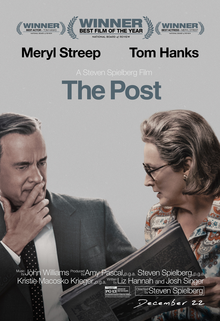‘The Post’ Reinvigorates Political Themes
“It’s frankly disgusting the way the press is able to write whatever they want to write.”
— President Donald Trump
“The press is the enemy.” — Former President Richard Nixon
 Steven Spielberg’s take on the publication of the Pentagon Papers in his most recent film, The Post, is inspiring in its subtlety and breathtakingly delivered by its stellar cast of actors, including Meryl Streep as Washington Post owner Kay Graham and Tom Hanks as editor-in-chief Ben Bradlee. It’s one of few movies that can be faithfully described as vital in its message, respectful of its source, and thrillingly entertaining.
Steven Spielberg’s take on the publication of the Pentagon Papers in his most recent film, The Post, is inspiring in its subtlety and breathtakingly delivered by its stellar cast of actors, including Meryl Streep as Washington Post owner Kay Graham and Tom Hanks as editor-in-chief Ben Bradlee. It’s one of few movies that can be faithfully described as vital in its message, respectful of its source, and thrillingly entertaining.
Some of you might be thinking at this point, “wait, hold on, what are the Pentagon Papers? Should I know about this?” Yes, you should know about them. Here’s a brief summary: in 1967, then-Secretary of Defense Robert McNamara requested the drafting of a classified study of the U.S.’s involvement in the Vietnam war to serve as a written record for future historians. A strategic analyst for the Department of Defense who worked on preparation for the study named Daniel Ellsberg, having come to believe the war was unwinnable, photocopied and distributed portions of the Top-Secret study to the New York Times for publication. The Supreme Court issued a restraining order preventing further publication of the material, deeming it detrimental to the security of the U.S.. During this period, the Washington Post aided the New York Times by continuing to publish sections of the Pentagon Papers, and in the now famous court case New York Times Co. v. United States, the court decided that the publication was protected under the First Amendment.
The significance of this small chunk of history lies in the fact that it was the first and only time the government has successfully (albeit temporarily) barred a newspaper from publishing an article, but that significance is held aloft if and only if it never happens again — that is why this movie is so important and the timing of its release so relevant.
Now, back to the film itself: I must shamefully admit that had I known Steven Spielberg to have been the director before I entered the theater, my first impression of this movie would have been tainted. Having gotten that out of the way, I can say with elation that The Post breaks many of the conventions I have negatively associated with Spielberg’s work in the past: stereotypical depictions of relationships deserving of greater depth, undigested narratives, and sentimentality in over-dose inducing quantities were all absent. I was pleasantly surprised by the simplicity with which the story he told rested on its historical counterpart with little fictional embellishment. The fast-paced, single-shot camera runs through the newsroom and in the hallways of the Washington Post building were used sparingly and, because of this, were stunning in their effect, allowing the audience a brief entry into the chaotic scene. Whether it was the conscious way the script was written or simply the natural way Streep, Hanks, and the rest of the cast navigated around it, the dialogue felt remarkably realistic in the way the characters often spoke over each other and occasionally stumbled out the words as though they really were speaking them for the first time. The way scenes involving Streep’s character, a lone woman in a world dominated — no, entirely filled — by men, were filmed brought attention to the suffocation and usurpation Kay Graham had to fight against to be treated with the respect her position as the owner of Washington Post deserved; subtle choices such as placing her behind men beneath her in rank, having her voice go unheard in meetings only for her words to be suddenly acknowledged when repeated by a male coworker, and the legitimacy of her decisions regarding the company questioned no matter how small all added to the feeling without coming out and directly saying it.
Speaking of Streep’s unsurprisingly breathtaking performance as the first female Fortune 500 CEO, there is great and triumphant irony in her being cast in the role of a woman so influential in the history of fighting for First Amendment rights in the face of an unwilling president: you may remember our current president calling her “one of the most over-rated actresses in Hollywood” after she used her acceptance speech at the Golden Globes to call for the protection of journalists. Streep once again stuns in her ability to play a unique role, taking on Graham’s mannerisms and speech patterns as though they came as easily to her as breathing. Her performance is complimented by Hanks as Ben Bradlee; Hanks puts a fresh spin on the role, taking inspiration from those who have played Bradlee in other film adaptations without allowing them to stifle his own touch. Not one of the supporting actors felt out of place, and Bob Odenkirk, Bradley Whitford, and Matthew Rhys especially added to the show.
The film is remarkably accurate to the real-life narrative, and although I recommend that no one miss out on seeing it, I would caution viewers to consider it a jumping off point — a supplement to your learning about the Pentagon Papers and the Watergate scandal, not a substitute for external research. The New York Times’ role in the publication is largely skimmed over and should absolutely be looked into further, and I would recommend reading Kay Graham’s autobiography, Personal History, for deeper insight on the story.






